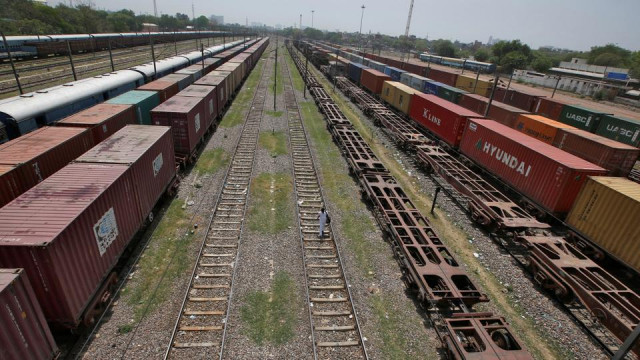Internal rifts emerge over $6.7b ML-I project approval
Planning ministry refutes FO’s statement that ECNEC deferred approval of CPEC project

The planning ministry has refuted the Pakistan Foreign Office’s statement about the $6.7 billion Mainline-I (ML-I) project of the China-Pakistan Economic Corridor (CPEC), asserting that the Executive Committee of the National Economic Council (ECNEC) did not defer the approval of the scheme last week.
In a highly unusual move, the planning ministry contested the official statement issued by the Foreign Office following the ECNEC meeting. Deputy Prime Minister and Foreign Minister Ishaq Dar chaired the ECNEC meeting last week.
“To clarify, the ECNEC did not defer approval of the ML-1 project under the CPEC,” stated the office of Planning Minister Ahsan Iqbal. The statement added that there is a misunderstanding regarding ECNEC’s decision on the ML-1 project.
Last Saturday, the Foreign Office stated that “ECNEC did not clear the re-modified PC-I for the ML-I upgrade and advised Pakistan Railways to consider preparing smaller projects and packages for financing and implementation.” The planning ministry’s decision to publicly renounce the Foreign Office’s statement on a highly sensitive matter indicates internal rifts within the ruling party.
Unlike in the past when the ECNEC was chaired by the finance minister, Prime Minister Shehbaz Sharif has retained the chairmanship and appointed Foreign Minister Ishaq Dar as its alternate chairman. Dar chaired the ECNEC meeting in the PM’s absence.
ECNEC has the mandate to approve mega development projects worth over Rs7.5 billion. The revised cost of the ML-I project is $6.7 billion or Rs1.9 trillion. The project is considered strategically important, and Pakistan has sought a concessional loan from China for its completion.
The ML-I project has faced delays of over five years due to Pakistan’s high indebtedness. Pakistan has requested a loan equal to 85% of the project cost from China. However, the Chinese authorities have not yet agreed to the concessional loan, and terms of the deal remain under discussion. Pakistan is urging China to initiate the bidding process for the ML-I project and hold the joint financing committee meeting to finalise the loan terms. Internal confusion may undermine these efforts, said Pakistani sources.
The planning ministry clarified that the prime minister of Pakistan and President Xi Jinping had agreed to advance the ML-1 project in phases during a recent meeting in Beijing. Consequently, the ECNEC directed the Ministry of Railways to resubmit their PC-I for Phase-1, covering the Karachi-Multan section, as agreed upon by both countries’ leadership. The amended PC-I will be presented in the next ECNEC meeting, said the ministry.
Earlier, the planning commission had assessed the ML-I project as “unviable” due to cost reductions leading to significant changes in its design and scope. Beijing had previously asked for the project cost to be reduced by one-third to $6.7 billion, which, according to planning commission officials, made the project unviable. The Commission cited compromises on speed limits, line capacity, rolling stock, axle load, and the deletion of the fencing plan as reasons.
The original ML-I track was 1,872 km long, but the Ministry of Railways now proposes rehabilitating a 1,726 km track. In a meeting of the Central Development Working Party that cleared the project for the ECNEC consideration, the Ministry of Finance noted that the project conflicted with the goals of the next International Monetary Fund (IMF) loan programme.


1733130350-0/Untitled-design-(76)1733130350-0-208x130.webp)
















COMMENTS
Comments are moderated and generally will be posted if they are on-topic and not abusive.
For more information, please see our Comments FAQ